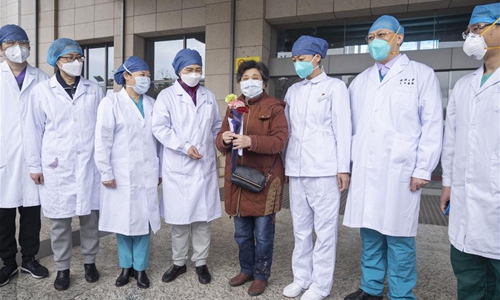HOME >> CHINA
‘A pity’ national expert team failed to see Hubei officials at start of epidemic: CDC epidemiologist
Source:Global Times Published: 2020/3/24 22:56:16

Ms Xie, the 600th cured patient of COVID-19 at the east branch of Renmin Hospital of Wuhan University, poses for a photo with renowned Chinese epidemiologist Li Lanjuan and other doctors at the hospital in Wuhan, central China's Hubei Province, March 16, 2020. The 600th patient confirmed of novel coronavirus infection has been discharged from the east branch of the hospital on Monday. (Xinhua/Cai Yang)
It is a pity that the high-level expert team sent by the National Health Commission did not have a chance to talk to the local chief leaders during its stay in Wuhan, Hubei Province, in January, a top epidemiologist in the team said on Tuesday.
Analysts suspect such "bureaucracy" and lack of communication between professionals and policymakers in the early stage of COVID-19 epidemic have hampered a more decisive strategy in curbing the outbreak.
Prominent respiratory expert Zhong Nanshan and epidemiologist Li Lanjuan were also in the team that started working in Wuhan from January 19.
Zeng Guang, an epidemiologist in the team, who is with the Chinese Center for Disease Prevention and Control, noted an important lesson from SARS outbreak in 2003 was direct communication between medical experts and policymakers. Experts' advice would be listened to and adopted, Zeng said.
Zeng was in the national expert team during the SARS outbreak in 2003 and the H1N1 outbreak in 2009.
"This time in Wuhan, we didn't see the major leaders of the city and Hubei Province, and our advice did not get heard in a timely manner," Zeng noted.
The expert team suggested the city lockdown when there were 300 infections nationwide, but the number doubled when Wuhan finally announced the lockdown on January 23.
Despite the lockdown, infections in Wuhan kept surging for weeks as the effect of stringent measures could only be seen after carriers gradually showed symptoms, considering COVID-19's long incubation period and infectiousness in the course of incubation.
Analysts noted the ineffective communication between medical professionals and policymakers is evidence of bureaucracy affecting more stringent and decisive policy-making when the outbreak started.
Media have previously reported that frontline doctors' findings and suggestion on prevention measures when they first detected the disease were not timely adopted in hospitals.
Posted in: SOCIETY,CHINA FOCUS